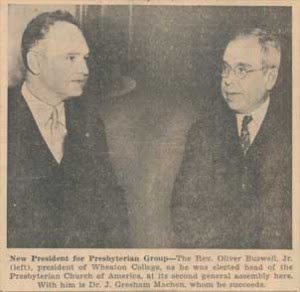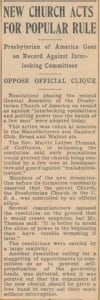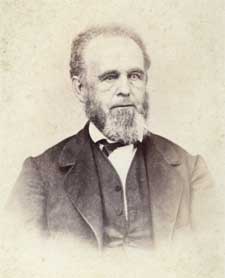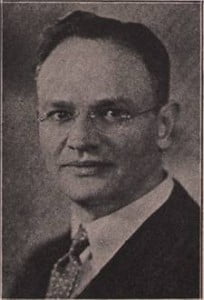In the latter part of 1860, President James Buchanan made a proclamation setting January 4, 1861 apart “for fasting, humiliation, and prayer throughout the nation.” When that day arrived, across the nation special services were held in churches, public buildings were closed, and many businesses were shuttered for the day. Among the many Presbyterian pastors who answered the call to preach that day, the Rev. George Duffield, Jr. began his sermon that day with an overview of the nation’s long tradition of coming before the Lord with humble petition. When his sermon was later published, he added a brief Preface. Both the Preface and the sermon introduction are reproduced below.
Rev. Duffield begins:—
The history of this Sermon is a very simple one. The phrase “National Sins” in the President’s Proclamation, suggested an inquiry as to what these sins were? One of the sources of information on this topic, it occurred to us, would be the sermons that had been delivered on other National Fast Days. Many such being just at our hand, we turned them over with no little interest and curiosity. The more we “touched the bones of the prophets,” the more we felt that virtue came out of them.
“Faithful men,” indeed, were these old Fathers, to whom the Gospel in all its relations, both temporal and eternal, might be most safely entrusted! Though a reward was offered for their heads, they preached; though a Tory party in the Church might wish to keep them quiet, still they preached; though their brethren not infrequently found vehement fault with them for so doing, yet, the Word of God “burning like a fire in their bones,” they could not do otherwise than preach. The Chinese idea which so many have been endeavoring to inculcate of late, that “to speak of politics is to be guilty of death,” by such men as Mayhew, Witherspoon, Emmons, &c., would have been laughed to scorn! “Dumb dogs that cannot bark,” could not be said of them, any more than of Calvin, and Knox, and the staunch old English Puritans! Thank God that such men lived on this side of the Atlantic, as well as the other!
There is no excuse for us if we do not try, at least, to imitate their example. If ever the pulpit is to regain that influence which it has lost in our land, it must be by preaching occasionally such sermons as that of Dr. Langdon,* “Governments corrupted by vice, and restored by virtue,” May 31st, 1775, from a favorite text in those times, Isaiah 1:26. “And I will restore thy judges as at the first, and thy counsellors as at the beginning.” As ministers we must study, and quote, and preach upon that other text as often as they did, viz. : Isaiah 40: 12, “The Nation that will not serve Thee, shall perish;” further enforced by Jeremiah 18:3-10. The hitherto unpublished document of the old Chaplain in the Appendix will show how far we have drifted, we greatly fear, in the wrong direction. Stirring times may be before us, and that very speedily; “wherefore, let us gird up the loins of our mind, be sober, and hope to the end!” Should our humble effort in this discourse be of no further service, it may at least save some valuable ministerial time in the way of reference. The man who would write a good religious history of this Nation, could scarcely do his countrymen a better service. Is it yet too late for our American Wilberforce, Theodore Freylinghuysen, to do it?
*See the Pulpit of the American Revolution; or, the Political Sermons of the period of 1776, by John Wingate Thornton, Boston, 1860.
—George Duffield, Jr.
Philadelphia, January 5th, 1861.
THE GOD OF OUR FATHERS.
“For the Lord spake thus to me with a strong hand, and instructed me that I should not walk in the way of this people, saying,
Say ye not, A Confederacy, to all them to whom this people shall say, A Confederacy; neither fear ye their fear, nor be afraid.
Sanctify the Lord of Hosts Himself; and let Him be your fear, and let Him be your dread.
And He shall be for a Sanctuary.” — Isaiah 8:11-14.
“Went to church and fasted all day.” Such is the record in the private journal of the great “Father of his Country,” under date of Wednesday, June 1st, A.D., 1774; a day solemnly appointed by the Assembly of Virginia, on hearing of the passage of the Boston Port Bill, “as a day of fasting, humiliation and prayer, to avert from us the evils of civil war, and to inspire us with firmness in support of our rights.”
A year later, just after the battles of Lexington and Bunker Hill, the Old Continental Congress appointed a day of General Fast.
On May 17th, 1776, “which was kept as a national fast, George Duffield, the minister of the Third Presbyterian Church in Philadelphia, with John Adams for a listener, drew a parallel between George the First and Pharoah, and inferred that the same Providence of God which had rescued the Israelites, intended to free the Americans.”
Could it have been in remembrance of this day in Old Pine Street [this was the original name of the Third Presbyterian Church], that “unfashionable as the faith in an overruling Providence” then was, this same John Adams was not ashamed to proclaim another National Fast, May 9th, 1798? Was it an evidence of the value of such a day, that even though hostilities had actually commenced between the United States and France, and a vessel of each nation had suffered capture, that such a body of men as the French Directory, so speedily and unexpectedly made overtures of peace, and that of their own accord?
In the fourth year of the second war with Great Britain, the example of John Adams was followed by President Madison, and January 12th, 1815, was recommended by him as a National Fast Day.
Even while the people were yet speaking, He “in whose hand the king’s heart is as the rivers of water; and who turneth it whithersoever he will,” heard their prayer; and only one month after, February 18th, 1815, they received “an answer of peace,” literally, and had the privilege of celebrating a day of National Thanksgiving.
The last two days of this character are within the recollection of nearly all here present, viz. : May 14th, 1841, being the day of national fast recommended by Mr. Tyler, on the decease of President Harrison; and August 3d, 1849, the fast day recommended by President Taylor, that God in mercy would arrest the further progress of the cholera.
Once more, and it may be for the last time, a Proclamation comes from the President of the people of the United States, designating this 4th day of January, 1861, as a day of fasting, humiliation and prayer, throughout the Union, that God may “remember us as he did our fathers.”
As Presbyterians, we are in no doubt as to the propriety of observing this day. “If at any time,” says our excellent Directory for Worship, “the civil power should think it proper to appoint a fast, it is the duty of the ministers and people of our communion, as we live under a Christian government, to pay all due respect to the same.” We are at no loss as to the manner of observing the day. “There shall be public worship upon all such days, and let the prayers, psalms, portions of Scripture to be read, and sermons, be all in a special manner adapted to the occasion.” As to the character of the prayers and sermon, the book is even more explicit still. “On fast-days let the minister point out the authority and providences calling to the observation thereof; and let him spend a more than usual portion of time, in solemn prayer, particularly confession of sin, especially of the day and place, with their aggravations, which have brought down the judgment of heaven. And let the whole day be spent in deep humiliation and mourning before God.”
Evidently in the minds of those who framed the Constitution of the American Presbyterian Church (adopted in the same year, and framed by some of the same men who framed our National Constitution, now in such imminent danger), the proper observance of such a day as this, both on the part of minister and people, was considered by them one of the most solemn and important duties that could possibly be discharged on earth.
“When the lion roars it becomes us to fear; when God’s hand is lifted up, and he appears about to strike, it is high time for us to strip ourselves of our ornaments, and to lie down in sackcloth and ashes.” As one of the watchmen on the walls of Zion, appointed of the Lord, if appointed at all, in Israel, “to hear the word at my mouth, and give them warning from me,” I must confess in all sincerity of heart, that never did I enter the House of Prayer on so solemn an occasion as the present—never did I venture to speak under a more tremendous pressure of personal and relative responsibility, to blow the trumpet with no uncertain sound! Business pausing in the midst of the week, and closing her shops, and stores, and factories! Religion throwing open her thousand temples, to invite within them those who believe that “only the omnipotent arm of God can save us from the awful effects of our follies and our crimes;” he only will speak aright at such a time as this, to whom God shall speak “with a strong hand,” and whom he will instruct accordingly. When “the voice of the Lord is upon the waters, and the God of glory thundereth,” all that man can say, is only as the faint echo that dies on the distant shore.
As appropriate to the occasion that has brought us together this morning, I propose, for the most part, in the way of an humble chronicler of the dealings of God with us, in our moral history as a nation, to direct your thoughts,
I. To Our National Mercies.
II. Our National Sins.
III. Our National Judgments.
IV. Our National Position.
V. Our National Duties.
Words to Live By:
“Ah sinful nation, a people laden with iniquity, a seed of evildoers, children that are corrupters: they have forsaken the Lord, they have provoked the Holy One of Israel unto anger, they are gone away backward.” — Isaiah 1:4, KJV.
While we may readily point out the sins of our fathers, were our ancestors alive today, what sins of ours would cause them to cover their faces and despise our claim to be Christians? We have no moral superiority over former generations. If anything, we may be in a far more precarious position. And so as true today as ever, we need humility and repentance as we stand before our Lord. We need to cry out for His mercy and we desperately need the fear of the Lord. We stray so easily, and so repentance must become a daily, even constant discipline. Salvation belongs to the Lord. His blessing is upon His people. On Him we can rely.
 , and the assembled delegates then celebrated the Lord’s Supper. The Rev. J. Oliver Buswell, Jr. and the Rev. J. Burton Thwing were nominated for Moderator of the Second General Assembly, and Rev. Buswell was elected to serve, the Rev. Cornelius Van Til and the Rev. Carl McIntire escorting Rev. Buswell to the platform. The election of Rev. Buswell as Moderator was, for one, seen as a way to minimize the possibility of friction over the issue of pre-millennialism, Buswell himself being a pre-millennialist. Ultimately that gambit did not succeed, and the young denomination suffered a split in 1938, with the formation of the overtly pre-millennial Bible Presbyterian Synod.
, and the assembled delegates then celebrated the Lord’s Supper. The Rev. J. Oliver Buswell, Jr. and the Rev. J. Burton Thwing were nominated for Moderator of the Second General Assembly, and Rev. Buswell was elected to serve, the Rev. Cornelius Van Til and the Rev. Carl McIntire escorting Rev. Buswell to the platform. The election of Rev. Buswell as Moderator was, for one, seen as a way to minimize the possibility of friction over the issue of pre-millennialism, Buswell himself being a pre-millennialist. Ultimately that gambit did not succeed, and the young denomination suffered a split in 1938, with the formation of the overtly pre-millennial Bible Presbyterian Synod. Caption for the news clipping photo at right: At the left is Dr. J. Oliver Buswell, Jr., president of Wheaton College, who was elected at the opening business session of the second General Assembly of the Presbyterian Church of America here yesterday. he succeeds Dr. J. Gresham Machen, of Philadelphia, show at the right, who was one of the leaders in the revolt of Fundamentalists from the Presbyterian Church in the U.S.A. The revolt let to the formation of the new church at the first General Assembly, June 11.
Caption for the news clipping photo at right: At the left is Dr. J. Oliver Buswell, Jr., president of Wheaton College, who was elected at the opening business session of the second General Assembly of the Presbyterian Church of America here yesterday. he succeeds Dr. J. Gresham Machen, of Philadelphia, show at the right, who was one of the leaders in the revolt of Fundamentalists from the Presbyterian Church in the U.S.A. The revolt let to the formation of the new church at the first General Assembly, June 11. NEW CHURCH ACTS FOR POPULAR RULE
NEW CHURCH ACTS FOR POPULAR RULE


